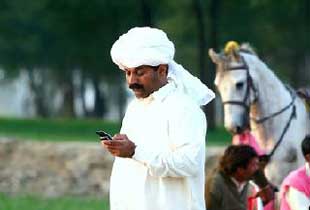
The Nation,newspaper, chief reporter Afzal Bajwa has been to US recently for fellowship program in Stanford University. On his arrival in US, he came across some cellular operators . Following is what he wrote in his article… Keep reading to know how better Pakistan is from USA and other countries when it come to cellular networks.
Back home, pre-paid SIM cards are common, and I assumed that the AT&T store would try to sell me one for use during my three-month visit to the U.S. But the front-desk folks immediately asked me to sign up for a year-long contract if I expected to get an affordable deal. Subsequent encounters with other cellular operators here made me to realize that although Silicon Valley is considered the world center for innovation and technology, the U.S. wireless market is inflexible and uncompetitive.
For the first time in my life, I felt that Pakistanis were better served than Americans, with at least five world-class operators in Pakistan engaged in fierce competition.
In Pakistan, all carriers use GSM technology, making it easy for customers to switch service providers; in the U.S., moving from Verizon to AT&T or vice-versa means having to pay for a new handset, since Verizon uses CDMA and AT&T uses GSM.
In Pakistan, you can recharge your pre-paid SIM card at any retail store, unlike here in the U.S. where you need to look for the particular operator’s outlet.
In Pakistan, multiple operators already offer next-generation WiMax wireless service; in the U.S., Sprint’s WiMax network is getting off to a sputtering start. And Pakistan’s regulators are reviewing license applications for 3G video services, while Americans are still trying to get their pricey iPhones to work reliably on AT&T’s 3G network at all.
I already had a Nokia E90 Communicator smartphone, with 3G connectivity, a real QWERTY keyboard, a full office suite, strong e-mail features, and multimedia capabilities. For me, it’s a more useful device than the iPhone, and I didn’t want to give it up. And the local technology-obsessed people in California I showed it to were impressed by it, even though this powerful phone seems to be largely unknown in this country. But it’s a GSM handset, so I had to discard every operator that doesn’t offer GSM: MetroPCS, Sprint, and Verizon.
My only remaining options were AT&T and T-Mobile. The plans they offered weren’t competitive with the ones I was used to back home: Rather than paying at least $75-100 per month for unlimited voice and data, I would have been better off using international roaming on my own Pakistan cell number.
Free incoming calls and free incoming text messages are common in Pakistan, but when I asked AT&T and T-Mobile’s staffers about them, they didn’t seem to know what I was talking about.
One rep at an AT&T store in San Francisco seemed to be more aware of the cell-phone world outside the U.S.–he smiled and said, “there is no such thing like free incoming here, but they probably offer it in Europe.” But he probably didn’t realize that Pakistan carriers offer cheap plans with no charge for incoming calls and text messages.
The service is so affordable that even low-paid laborers and daily market vendors benefit from it.
Pakistan’s mobile-phone growth has been among the fastest in the world: Usage has increased from perhaps just a few percent of the population in 2003 to more than fifty percent of the country’s 160 million citizens.Mobile carriers are collaborating with the government to extend state-of-the-art wireless connectivity from coastal areas to glacier-covered mountains like K2. They’re also bringing mobile-phone banking to the remotest farming communities, to strengthen agriculture, the backbone of Pakistan’s economy.
It’s the simplicity and low cost of wireless service that have driven the growth that gives mobile carriers the millions in profits they need to invest in these advances. And as I’ve dealt with the challenges of wireless here in the U.S., I appreciate what the wireless companies back home are accomplishing even more.
Source: Afzal Bajwa